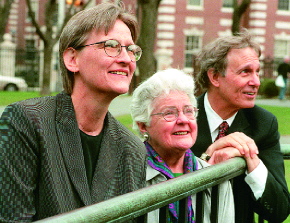For Radcliffe: A "Founding Dean"

Looking ahead: new Radcliffe dean Drew Gilpin Faust, acting dean Mary Maples Dunn, and President Neil L. Rudenstine.
Photo by Marc Halevi/Harvard News Office
From the moment Harvard University and Radcliffe College announced that they would merge and form the Radcliffe Institute, the identity of the institute's first dean became a paramount consideration. The "founding dean" would launch Radcliffe's reincarnation as an institute for advanced study, one whose form, character, and direction would bear her lasting influence. This April, President Neil L. Rudenstine appointed historian Drew Gilpin Faust, a professor at the University of Pennsylvania, to the post. Faust declared herself "deeply honored to have been chosen for what seems to me the most exciting job in higher education."
A native Virginian and eminent Civil War specialist, Faust has been Annenberg professor of American history at Penn since 1989. Her 1996 book, Mothers of Invention: Women of the Slaveholding South in the American Civil War won the prestigious Francis Parkman Prize awarded by the Society of American Historians; the New York Times named it a Notable Book of the Year. For the past five years she has also directed the women's studies program at Penn, which boasts 115 affiliated faculty members from 28 departments.
Such experience should help her at the helm of the $300-million Radcliffe Institute, which has two missions: fostering research on women, gender, and society; and supporting advanced scholarship and artistic work in general. "We were looking for someone with both intellectual distinction and versatility, a person with 'interdisciplinary instincts,'" said Rudenstine. "Drew also has an open, candid, and winning style. We have exactly what we wanted in a first dean." Mary Maples Dunn, currently acting dean of the institute (who will continue in that role until Faust takes over on January 1, 2001), hailed "a brilliant appointment," adding, "I could not be more pleased." (At Bryn Mawr, where she earned her bachelor's degree in 1968, Faust studied with Dunn in a seminar on the Monroe Doctrine. "She was a wonderful student, the kind you shape your teaching to," Dunn recalls.)
Faust believes that Radcliffe's twin missions "should not be separated out into different parts of the institute, or into separate intellectual spheres. It's not really a dual mission, since we want to integrate the study of women, gender, and society with scholarship in a wide sense. That's the best way for these fields to have an impact beyond their own borders. Consider a topic such as justice. There could be several scholars working directly on gender-related issues, alongside others who were studying justice but not thinking about gender. By the end of the year, maybe everyone would be thinking a bit differently." Regarding the presence of both scholars and artists, she says, "Intersections between fields and across boundaries are important ways of refashioning knowledge in the new century. Scholarship is creativity. Take the idea of a conference on aesthetics, which Mary [Dunn] has been working on. What better place could there be for a dialogue on aesthetic issues that included both scholars and working artists?"
Regarding her personal brand of feminism, Faust says, "I'm reminded of a bumper sticker that says, 'Feminism is the presumptuous assumption that women are human beings.' Exploring different definitions of feminism is exciting. I wouldn't want to pin anyone down to just one version; it can be different for everyone."
Faust received her doctorate in American civilization in 1975 from Penn, where she has spent her academic career. She has published five books, but only the last, Mothers of Invention, focuses on women's history. "Women's history wasn't even a recognized field when I was taking courses as a graduate student. It came even more slowly into Southern history," she told a campus reporter at Penn in 1996. "There wasn't an obvious set of problems that one was presented with, so I latched onto problems more evident in my field--and that slowed my approach to Southern women's history." Her current project concerns the impact of the Civil War's enormous death toll--which equals the combined total of all other American war deaths through the first years of Vietnam--on American society.
In 1989, Faust and her husband, Charles S. Rosenberg, a distinguished medical historian, both received tenure offers from Harvard. "We decided not to move," she explains. "Our roots at Pennsylvania are very deep. It didn't seem worth the upheaval of everything."
The Radcliffe Institute opportunity, however, is something that Faust "couldn't replicate at Penn." She will also be appointed professor of history; Rosenberg has received a Harvard offer as well. They plan to live at Greenleaf House, the Brattle Street mansion that until recently was the home of Radcliffe presidents.
At 5 feet 11 inches, the incoming dean is a woman of stature in both the literal and scholarly sense. She counterbalances her intellectual work with detective stories and a daily four miles on a treadmill. Faust is also "a big baseball fan," and confesses that the move from Philadelphia to Boston entails a stressful adjustment to the American League. "I don't believe in the designated hitter," she explains.





